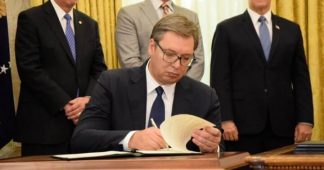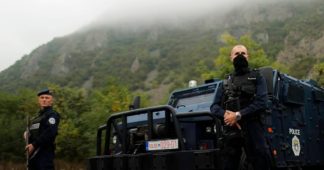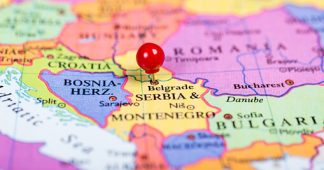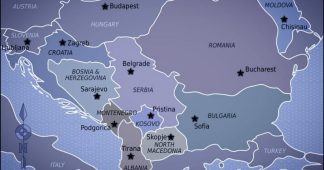Apr 6, 2023
There is a lot of diplomacy evolving around the Kosovo in the recent weeks. Among increasing tensions and even threats of clashes, negotiations between the Kosovar authorities and Serbia have started. The European Union plays a crucial role in mediating these.
At the same time, hosting the biggest US military base in Europe, Kosovo is also considered a piece in the East-West conflict that erupted in, but is not limited to Ukraine.
What is the content of the current negotiations? How is the perception in Serbia in regards to these? Where can these negotiations lead to, and which role plays the NATO presence in the Kosovo? What is Serbia’s perspective on a EU-membership and how does the country position itself in regard to sanctions against Russia?
We asked these questions to Dragana Trifković, the General Director of the Center for Geostrategic Studies from Serbia.
What do the normalization negotiations that started on 18 March 2023 mean for the two countries?
The meeting in Ohrid between the President of Serbia, Aleksandar Vučić, and the Prime Minister of the unrecognized state of Kosovo, is a continuation of the negotiations between Belgrade and Pristina on the platform of Brussels. The mediation of the European Union in the negotiations was established in 2010 by the adoption of a resolution in the UN General Assembly, in order to facilitate the dialogue process between the two parties. It was planned that in the process of negotiations on the Brussels platform, the two sides would agree on technical issues, but these negotiations were raised to a higher level after the arrival of Aleksandar Vučić to power and changed their character by pretending to resolve the status of Kosovo, which is not within the competence of the EU. The only legally valid document for resolving the Kosovo issue is UNSC Resolution 1244, but considering that the American project of Kosovo’s independence depended on the Russian veto in the UN Security Council, the USA found an alternative through the mediation of Brussels.
However, the signed Brussels Agreement from 2013 as well as the Annexes to this agreement are unconstitutional, and the Serbian regime agreed to hand over all attributes of statehood to the so-called independent Kosovo. It goes without saying that the Brussels agreement is in conflict with international law, i.e. the valid Resolution 1244. After the meeting in Ohrid on March 18 of this year, it was agreed to begin the implementation of the already signed agreements, which is practically the last step in the realization of the American plan for Kosovo’s independence. However, the citizens of Serbia are not ready to accept such a thing, and for this reason the Serbian president is trying to mislead the public that “he did not sign anything”. It is true that the implementation plan was not signed on March 18 in Ohrid, but Article 3 of the Vienna Convention on Contractual Plans states that in the case of international agreements that were not concluded in writing, this does not affect the legal values of this agreement. The citizens of Serbia heard from EU official Josep Borell that the President of Serbia agreed with the implementation plan, that is, with the Annex on the implementation of the agreement on the path to normalization of relations. So, for the American project of Kosovo’s independence, this is another step in the realization of the project, and for the Serbian side, the continuation of the unconstitutional actions of the current regime. There is not even a word about the normalization of relations, because they cannot be achieved this way.
Plan of normalization a “copy of the model of arrangement between West and East Germany, 50 years ago”
Is there a possibility that Serbia will recognize Kosovo as a result of these negotiations?
Serbia is not required to recognize Kosovo’s independence, but it is required to de facto realize it by implementing specific unconstitutional steps. The Franco-German plan, or rather the EU plan for the normalization of relations between Serbia and its southern Serbian province, is based on the model of the arrangement of relations between the two Germanys after the end of the Second World War. In 1972, West and East Germany accepted the coexistence of two German states by treaty, but without formal mutual recognition. The plan on the normalization of relations between Serbia and Kosovo is a copy of the plan from 50 years ago. In 2007, during the negotiations in Vienna under the cover of the Contact Group (USA, EU and Russia), Serbia was offered to sign such a plan, called the Ischinger plan (the German diplomat Ischinger was the EU’s representative in the negotiations), but then Prime Minister Vojislav Koštunica refused, saying that Serbia does not want to sign the Kosovo independence plan. Therefore, everything is designed so that the American project of Kosovo’s independence is realized without Serbia’s formal recognition that it has been done. It should be noted that the Serbian president could be called to account for violating the Constitution, when the judicial system is freed from external control.
Which issues are the negotiations expected to resolve?
In my opinion, the negotiations have the sole aim of rounding off the so-called independence of Kosovo, because all the problems that existed in the past still exist and it is impossible to solve them through forced diplomacy, by violating international law and the Constitution of the Republic of Serbia. The main problem with Kosovo from the time of Yugoslavia until today is terrorism and ethnic separatism, which in recent decades has been supported and encouraged by the West, primarily the USA. An independent Kosovo has no perspective or economic viability, except to become a military base for the US military. For this reason, Albanians leave Kosovo en masse and go to Western European countries. The President of Serbia committed to the Plan on Normalization of Relations that Serbia will accept respect for the independence of Kosovo, the territorial integrity of this creation, that it will not oppose Kosovo’s membership in any international organization (including the UN) and that it will cultivate good neighborly relations with its southern province. All of the above de facto means acceptance of Kosovo’s independence. The Albanian side has committed to form a “Community of Serbian Municipalities” which will essentially have no responsibilities and will function within the framework of the so-called Constitution of Kosovo. The EU offers European integration to both sides, which in the conditions in which the EU finds itself today is completely undefined and without perspective. The agreement does not mention the return of over 250,000 Serbs who have been expelled from the territory of Kosovo and Metohija since the arrival of international forces.
From the Kosovo to the Islamic State and back: Western armies arrived to the Balkans and Islamic extremism got strengthened
How do you evaluate the NATO bases in Kosovo?
The opening of the largest American military base in Europe on the territory of Kosovo and Metohija, which is called Bondsteel, was the real reason for the initiation of military aggression against Serbia and the realization of Kosovo’s independence. Apart from the US, there are other occupying armies on the territory of Kosovo and Metohija, and in the meantime, the Kosovo army was formed illegally, which is contrary to the valid Resolution 1244 of the UN Security Council. In recent months, the Kosovo separatist authorities have been building new military-police bases in the North of Kosovo where Serbs live, with the support of Great Britain. The goal is complete military control of this territory by Western forces. We have no insight into what the military bases of the occupation forces are for, that is, who is trained in them. What is certain is that some terrorists who were employed at the Bondsteel military base appeared in the ranks of the Islamic State on the territory of Syria and Iraq. Let’s say Lovedrim Mujaheri, an Albanian who was highly positioned in the Islamic State, worked at the Bondsteel military base. The largest numbers of fighters from the Balkans in the ranks of the Islamic State were from the territory of Kosovo and Metohija, which means that the arrival of Western armies in this territory strengthened Islamic radicalism and terrorism.
Terrorist training camps in Kosovo and Metohija have existed for many years, and now they have received formal frameworks, official military bases and an official army. The former training camps of the terrorist Kosovo Liberation Army, which played a key role in creating the conflict with Serbia, were also used for training and recruitment for the Islamic State. For this reason, in addition to the military control of this territory, the Western powers can also use it to encourage radicalism and terrorism, which then spreads to the whole of Europe. In any case, I think that the final outcome, regardless of current events, will be the evacuation of the occupying forces from the territory of Kosovo and Metohija.
Serbia and EU membership: Almost all political forces support it, large portion of citizens don’t believe in it
Does Serbia aim to join the European Union under the new circumstances following these negotiations?
The main foreign policy direction of Serbia, for many years now, is the path to the EU without an alternative. Almost all political forces in Serbia advocate Serbia’s entry into the EU. However, according to official polls, despite the huge pro-European propaganda in Serbia, the support of Serbian citizens for European integration is at a historic low. A large percentage of citizens believe that Serbia will never become the EU, and that European integration serves to blackmail Serbia. When asked whether they would support Serbia’s entry into the EU if the condition were an independent Kosovo (and that is a condition without guarantees for entry into the EU), over 85% of citizens answered no. Therefore, there is a big difference between the opinion of the citizens of Serbia and the political elites who should represent the interests of the citizens. The problem is in the selection and placement of personnel, corruption and external control. However, today it is not only a Serbian problem, but a general problem of many political elites, especially in Europe. I represent Eurosceptic views, that is, I am against Serbia’s entry into the EU. I think that in the process of European integration, Serbia completely lost sovereignty and control over its institutions. If the EU was once an attractive project, today it has absolutely nothing to offer.
Serbian population opposes sanctions
The West is pressuring Serbia to apply sanctions against Russia. How will Belgrade regard to that?
Informal sanctions against Russia have existed for a long time and they are reflected in the impossibility of developing cooperation between Serbia and Russia, non-acceptance of Russian investments, Russian proposals for cooperation, and so on. In almost all institutions that are effectively alienated, there is a network of the deep state made up of pro-Western cadres, which prevents a strategic connection with Russia, even though the absolute majority of Serbian citizens support such a direction. Formally, however, Serbia has not yet imposed sanctions on Russia. The West insists on that. Although earlier Aleksandar Vučić repeated that he would not impose sanctions on Russia, now he has changed his rhetoric and hints that this may still happen because Serbia cannot bear the pressure of Western powers. To a large extent, the public in Serbia is already preparing for the introduction of sanctions through anti-Russian propaganda and the mediation of Western agents, which has great influence. What has so far prevented the Serbian leadership from imposing sanctions on Russia is the great opposition of the majority of Serbian citizens. Serbia is the first country in Europe where mass protests were organized in support of the Russian special operation in Ukraine, and the majority of Serbian citizens believe that Russia is at war with NATO on the territory of Ukraine.
It should be noted that Serbia has no reason to impose sanctions on a friendly country that supports our interests on the international level and thanks to which Serbia ensures energy stability and security. However, I think that after the realization of the agreement on the normalization of relations with Pristina, the leadership of Serbia will take the next steps of giving in to the demands of the West, and I think that the introduction of sanctions against Russia is only a matter of time. All of this, together with the moves regarding Kosovo, directly puts the citizens of Serbia and the political leadership in a conflict of interest, so that we are seriously approaching a major destabilization of Serbia, which may concern the entire Balkans. Sanctions that Serbia would introduce to Russia cannot have any effect on Russia, but they would have a huge psychological effect if we take into account the historical connection between the Russian and Serbian people. Serbia would then be on Russia’s list of enemy states, which I believe would be shocking for both sides.
We remind our readers that publication of articles on our site does not mean that we agree with what is written. Our policy is to publish anything which we consider of interest, so as to assist our readers in forming their opinions. Sometimes we even publish articles with which we totally disagree, since we believe it is important for our readers to be informed on as wide a spectrum of views as possible.











